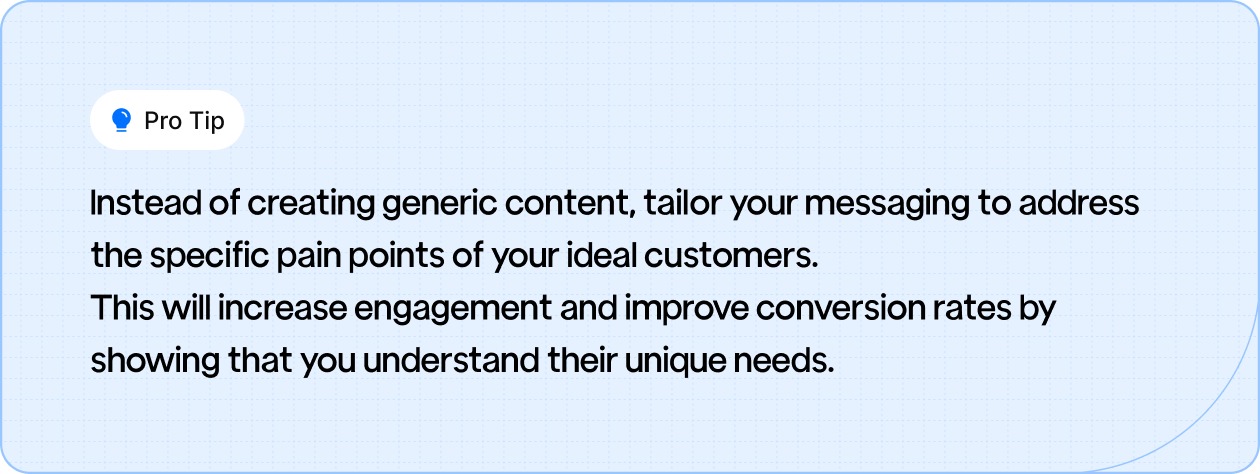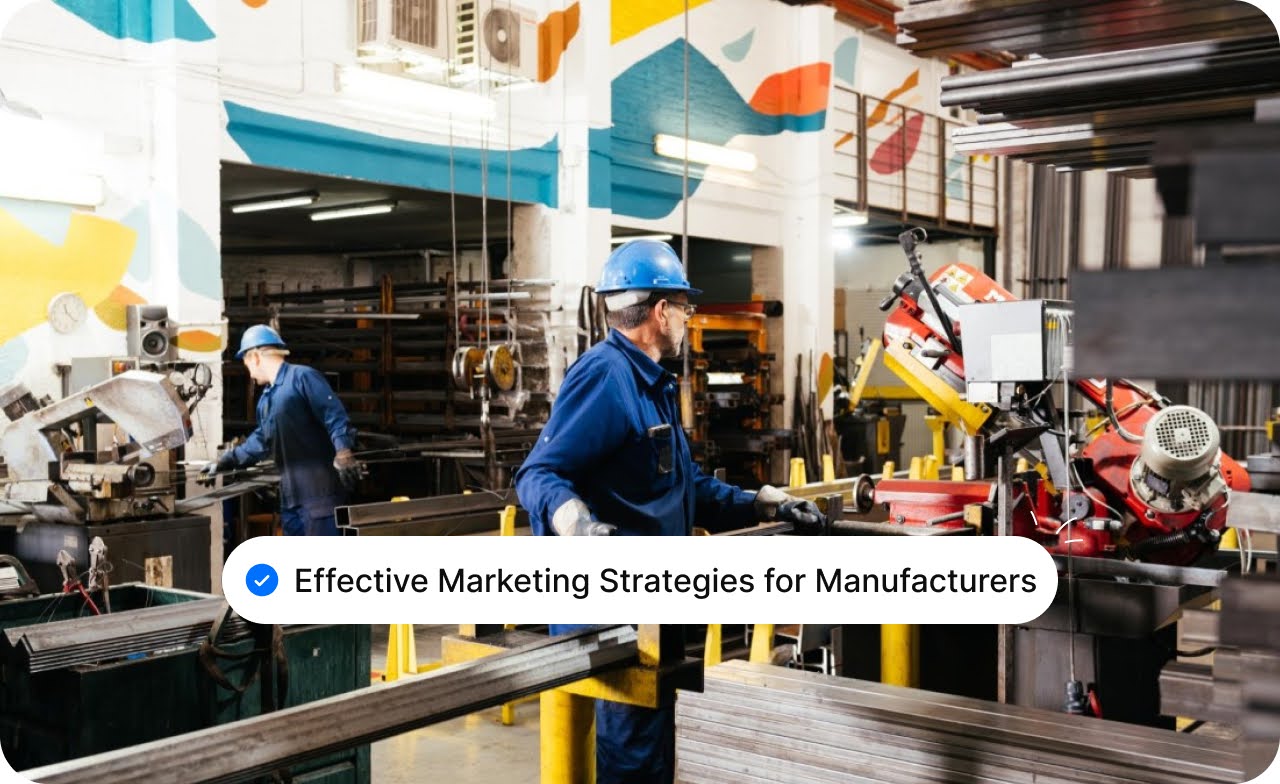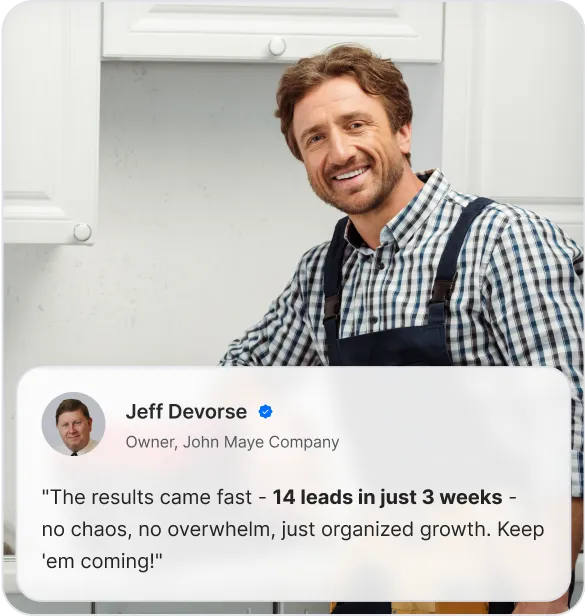The real frustration? Pouring ad spend into strategies that fail to filter out the noise, leaving your sales team to sift through inquiries that never stand a chance of converting.

This guide dives deep into manufacturer marketing strategies designed to target the precise audience that matters, decision-makers who know exactly what you offer and why it’s essential to their business.
Why Every Manufacturer Needs a Winning Marketing Strategy?
In the manufacturing industry, marketing is about building long-term relationships with the right buyers.
In B2B manufacturing, marketing helps create a clear brand presence, establish credibility, and generate quality leads. A well-structured marketing strategy ensures that your products reach the right people at the right time, helping your business stand out in a competitive market.
Without it, you risk becoming just another name in a crowded industry, struggling to get noticed.
The Real Struggles Manufacturers Face in Marketing
Manufacturers often face unique challenges when it comes to marketing. Here are a few of the biggest hurdles:
- Long Sales Cycles: B2B manufacturing sales cycles can be long, with decision-making often taking months due to the complexity of products and the need for multiple approvals. Marketing must support the entire journey from awareness to decision.
- Complex Products: Many manufacturers sell highly specialized or complex products that require detailed technical explanations. This can make traditional marketing methods like simple ads ineffective.
- Limited Visibility: In a market flooded with similar products, standing out can be a challenge. Without a strong marketing strategy, your business might struggle to get the attention it deserves.
A striking example comes from a Reddit discussion where a manufacturer revealed that despite generating millions in sales, they had invested almost nothing in marketing.
This lack of visibility led to the loss of several high-value accounts simply because potential clients were unaware of their existence.
How a Strong Marketing Strategy Pays Off for Manufacturers
A winning marketing strategy directly impacts your bottom line in several ways:
- Increased Lead Generation: Marketing helps attract qualified leads who understand the value of your product, improving the efficiency of your sales team.
- Improved Brand Recognition: Consistent, targeted marketing builds your brand’s reputation in the market, making it easier to convert potential customers into loyal ones.
- Expanded Market Reach: A strong marketing plan helps you tap into new markets, reaching clients you might not have had access to otherwise, and opening doors for growth.
Step-by-Step Guide for a Strong Manufacturer Marketing Strategy

A solid marketing strategy is essential for growth and attracting the right customers in the manufacturing industry.
Here’s a simple roadmap to create a plan that engages decision-makers and generates high-quality leads.
Step 1. Define Clear Marketing Goals (SMART Goals)
Start by defining SMART goals:
- Specific: What do you want to achieve?
- Measurable: How will you track progress?
- Achievable: Are your goals realistic?
- Relevant: Do they align with your business?
- Time-bound: When do you want to achieve them?
This ensures your marketing efforts are focused and measurable.
Step 2. Create Ideal Customer Profiles (ICPs) and Buyer Personas
Know your target audience:
- Ideal Customer Profiles (ICPs): Identify industries and businesses that would benefit most from your products.
- Buyer Personas: Understand the decision-makers’ roles, challenges, and needs.
This helps tailor your marketing to the right people.
Watch this video to learn more about crafting your marketing strategy and building strong customer profiles that resonate with the right audience.
(Embed the video here)
Step 3. Content Marketing Strategy
Create content that connects with your audience:
- Publish blogs, case studies, and webinars addressing their challenges.
- Position your brand as a leader with valuable insights.
Content builds trust and keeps your audience engaged.
Step 4. Leverage SEO & SEM
- SEO helps your website rank for key industry terms.
- SEM (paid ads) boosts visibility and brings in immediate leads.
Together, they increase your online presence and attract quality traffic.
Step 5. Social Media Marketing
Use platforms like LinkedIn to connect with decision-makers:
- Share content that addresses industry issues.
- Engage with prospects, answer questions, and build relationships.
- Social media allows real-time conversations and meaningful interactions.

Manufacturer Marketing Tactics You Need to Master Now
Manufacturers need to stay ahead by mastering the latest marketing tactics that drive engagement and lead generation.
These strategies will help you reach the right audience and increase your brand’s impact in the market.
1. Content Marketing
Manufacturers must focus on creating technical, value-driven content that speaks directly to their audience’s needs.
- Technical White Papers: Showcase your expertise by addressing industry-specific challenges and solutions in depth.
- Video Tutorials: Demonstrate your product’s features and applications through engaging, educational videos.
- Product Demos: Provide potential customers with hands-on, real-world examples of how your products solve their problems.
This approach positions your brand as a trusted resource and drives higher engagement with a targeted audience.
2. Trade Shows & Industry Events
Trade shows, both in-person and virtual, offer invaluable opportunities to connect directly with your audience.
- In-Person Events: Make the most of face-to-face interactions by showcasing your products and networking with industry professionals.
- Virtual Events: Leverage digital platforms to reach a wider audience, host webinars, and demonstrate thought leadership.
Use these events to engage prospects and nurture relationships that may convert into long-term partnerships.
3. Influencer & Partnership Marketing
Collaborating with industry influencers or partnering with other manufacturers can significantly expand your reach.
- Industry Leaders: Partner with trusted experts to amplify your brand’s credibility and influence within your sector.
- Co-Branding: Form alliances with non-competing manufacturers to cross-promote products to a similar target audience.
These partnerships can help increase brand visibility and credibility within your industry.
4. Email Marketing & Automation
Email marketing remains one of the most effective channels for B2B manufacturers.
- Nurture Leads: Develop email campaigns that provide valuable, relevant content tailored to each stage of the buyer’s journey.
- Marketing Automation: Use automation tools to segment your audience, personalize communications, and optimize campaigns for efficiency.
By automating your email outreach, you can build stronger relationships with prospects, making them more likely to convert.
5. Account-Based Marketing (ABM)
Focusing your marketing efforts on high-value target accounts allows you to create personalized campaigns for the businesses most likely to purchase.
- Tailored Campaigns: Design marketing content and outreach efforts that speak directly to the specific pain points of key accounts.
- Sales & Marketing Alignment: ABM requires close collaboration between marketing and sales teams to ensure seamless targeting and engagement.
This targeted approach maximizes the impact of your marketing budget, increasing conversion rates and driving revenue.
Must Read: Digital Marketing for Distributors: 10 Proven Strategies for Growth
B2B vs B2C: What Makes Manufacturing Marketing So Different?
B2B marketing for manufacturers differs significantly from B2C. Key distinctions include:
- Longer Decision-Making Cycles: B2B purchases often involve extended evaluation and approval processes.
- Multiple Decision-Makers: A team, including engineers, procurement, and executives, makes the final decision.
Niche Markets: Manufacturing often targets specialized industries, requiring tailored marketing approaches.
Marketing Best Practices for Manufacturers
To maximize the impact of your marketing efforts, focus on clear goals, tailored content, and continuous optimization.
Here are the best practices that will ensure your campaigns are effective and aligned with your business objectives.
1. Targeted Content
Create content tailored to each stage of the buyer's journey:
- Awareness: Address industry challenges.
- Consideration: Offer solutions to those challenges.
- Decision: Provide testimonials and product demos to drive final decisions.
2. Track & Measure Results
Track key metrics such as conversion rates, traffic, and leads to evaluate your campaign's performance. Tools like Google Analytics help you stay on top of your data.
3. Continuous Improvement
Marketing isn’t static. Test and optimize campaigns regularly based on performance data to stay responsive to market shifts.

How Automation is Shaping the Future of Manufacturing Marketing
Automation is transforming manufacturing marketing by improving efficiency and personalization.
Here’s how tools like CRM systems and AI-driven insights are helping manufacturers scale their efforts and drive better results.
Role of Automation
Marketing automation tools enable manufacturers to streamline processes, scale campaigns, and nurture leads more efficiently.
By automating repetitive tasks like email marketing, social media posting, and lead nurturing, you can focus on strategic decision-making while ensuring consistent engagement across multiple channels.
CRM Integration
Integrating marketing efforts with CRM systems allows for better lead tracking and management. It ensures your sales team has real-time data, leading to improved lead conversions and more personalized customer interactions.
Also Read: Why Smart Distributors Are Choosing CRM?
How to Build a Future-Proof Manufacturing Marketing Strategy
To drive growth and stay relevant in manufacturing, relying on outdated marketing methods or a self-managed approach is insufficient.
Manufacturers need a strategic, automated approach that integrates content, lead generation, and data-driven insights to create lasting impact.
- A clear marketing strategy is essential to reach the right decision-makers.
- Automating and streamlining your marketing efforts will boost efficiency and scalability.
- Aligning sales and marketing teams is crucial for maximizing conversions.
If you’re tired of inefficient marketing processes and missed opportunities, it’s time to invest in the right tools.
FAQs
Q1: What is digital marketing for manufacturers?
A1: Digital marketing for manufacturers involves online strategies like SEO, PPC, content marketing, and social media to attract, engage, and convert potential customers. It allows manufacturers to target specific industries and decision-makers while tracking real-time performance.
Q2: How can I generate quality leads for my manufacturing business?
A2: To generate quality leads, focus on creating valuable content such as case studies and technical guides, optimizing your website for search engines, and running targeted ads on platforms like Google and LinkedIn. This approach helps attract high-intent prospects who are more likely to convert.
Q3: What is Account-Based Marketing (ABM) and how does it benefit manufacturers?
A3: ABM is a strategic approach where marketing efforts are focused on a set of high-value target accounts. For manufacturers, ABM allows for personalized campaigns that address the specific needs of key clients, leading to higher engagement and conversion rates.
Q4: How can marketing automation help my manufacturing business?
A4: Marketing automation tools help manufacturers streamline processes, scale campaigns, and nurture leads more efficiently. By automating repetitive tasks, you can focus on strategic decision-making while ensuring consistent engagement across multiple channels.
Q5: What role does SEO play in manufacturing marketing?
A5: SEO helps improve the visibility of your website on search engines, making it easier for potential customers to find your products or services. By optimizing your website's content and structure, you can attract more organic traffic and generate quality leads.
Q6: How do I align my sales and marketing teams effectively?
A6: Aligning sales and marketing teams involves setting shared goals, using common tools like CRM systems, and maintaining open communication. This collaboration ensures that both teams work towards the same objectives, leading to improved lead management and higher conversion rates.
Q7: Why is continuous improvement important in manufacturing marketing?
A7: Continuous improvement allows manufacturers to adapt to changing market conditions, optimize campaigns based on performance data, and stay competitive. Regularly testing and refining marketing strategies ensures sustained growth and effectiveness.





















.webp)








.webp)
.svg)


.svg)
.svg)
.svg)




.svg)




.svg)